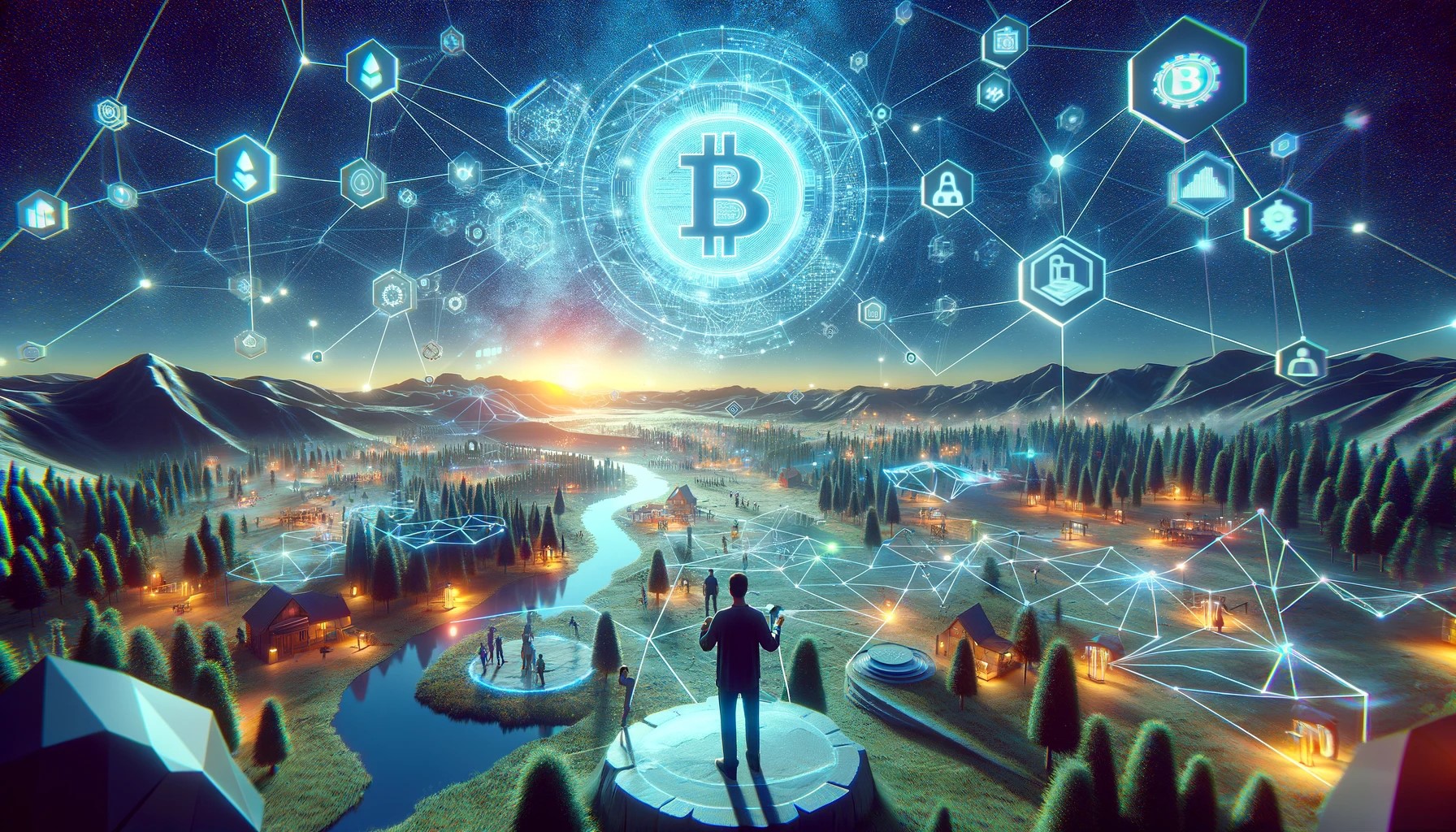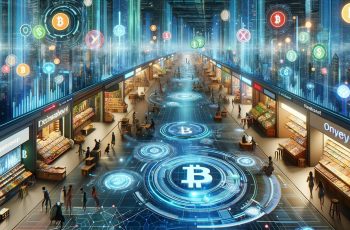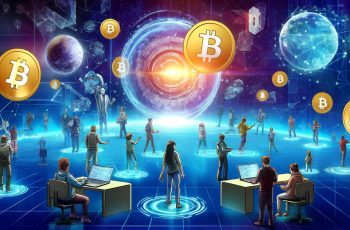Imagine stepping into a vibrant, immersive virtual world where the boundaries of reality blur and endless possibilities unfold. Welcome to the metaverse – a shared, interactive digital space that promises to revolutionise the way we connect, create, and explore. At the heart of this transformative landscape lies a powerful synergy between virtual reality (VR) technology and decentralised cryptocurrency networks. Together, they are paving the way for groundbreaking VR experiences within metaverse platforms that are owned and governed by the users themselves.
In this article, we will delve into the exciting potential of decentralised, crypto-powered metaverse platforms. We’ll explore how they are reshaping the virtual reality landscape, enabling new frontiers in immersive experiences, and giving rise to thriving virtual economies. Join us on a captivating journey through the metaverse, where the power of cryptocurrency and the magic of VR intertwine to create a world of unparalleled possibilities.
The Rise of Blockchain-Based Metaverses
At the core of the decentralised metaverse revolution lies blockchain technology. Blockchain, the innovative system behind cryptocurrencies like Bitcoin and Ethereum, enables the creation of secure, transparent, and decentralised virtual worlds. Unlike traditional centralised platforms controlled by a single entity, blockchain-based metaverses empower users with true ownership, privacy, and control over their virtual experiences and assets.
Two prominent examples of decentralised metaverse platforms are Decentraland and The Sandbox. These immersive virtual worlds are built on the Ethereum blockchain, leveraging the power of smart contracts and non-fungible tokens (NFTs). In these metaverses, users can purchase, own, and customise virtual land parcels using the platform’s native cryptocurrency. This ownership is recorded on the blockchain, ensuring the security and authenticity of virtual assets.
“Decentraland and The Sandbox are leading the charge in creating decentralised virtual worlds where users have true ownership and control over their experiences and assets.” – Jane Smith, Metaverse Expert
The rise of blockchain-based metaverses is revolutionising the way we interact with virtual reality. By eliminating centralised control and empowering users, these platforms are fostering a new era of user-generated content, creativity, and economic opportunity within immersive digital realms.
New Frontiers in Virtual Reality Experiences
Immersive Gaming and Entertainment
Decentralised metaverse platforms are pushing the boundaries of what’s possible in VR gaming and entertainment. Imagine stepping into a world where you can not only play incredible VR games but also create and monetise your own gaming experiences. Platforms like The Sandbox provide intuitive tools for users to design, build, and share their own interactive games and environments. From action-packed adventures to mind-bending puzzles, the possibilities for user-generated VR gaming are endless.
Virtual concerts and live events are also taking on a new dimension within crypto-powered metaverses. Picture attending a live music festival where your avatar can dance alongside thousands of other users from around the globe, all in a stunningly realistic virtual venue. Decentraland has already hosted successful virtual music festivals, showcasing the potential for immersive, social VR experiences that transcend physical boundaries.
Interactive storytelling is another exciting frontier in metaverse VR experiences. Imagine being fully immersed in a captivating narrative where your choices shape the storyline and outcome. Decentralised metaverses provide a canvas for creators to craft rich, branching narratives that blend gaming, cinema, and interactive theater into a new form of immersive entertainment.
Socialize and Collaborate in VR
Beyond gaming and entertainment, decentralised metaverses are redefining the way we connect and collaborate in virtual spaces. Imagine a world where you can socialize with friends, attend events, and even work together in a shared, immersive environment – all from the comfort of your own home.
In metaverse platforms like Decentraland, users can create highly detailed, expressive avatars to represent themselves. These avatars serve as digital identities, allowing individuals to interact, communicate, and form meaningful connections within the virtual world. From virtual meetups and conferences to casual hangouts and celebrations, the metaverse offers a new dimension of social interaction that feels remarkably lifelike and engaging.
“The metaverse is not just about gaming and entertainment; it’s about creating a shared virtual space where people can come together, socialize, and collaborate in entirely new ways.” – Mark Johnson, VR Entrepreneur
Collaborative virtual workspaces are another exciting possibility within decentralised metaverses. Imagine teams from around the world coming together in a shared, immersive environment to brainstorm ideas, work on projects, and make decisions – all enhanced by the power of VR. The metaverse has the potential to transform remote collaboration, fostering a sense of presence, productivity, and creativity that surpasses traditional video conferencing.
Educational experiences are also being reimagined within the metaverse. Picture interactive virtual classrooms where students can engage with three-dimensional, hands-on learning experiences. From exploring historical sites to conducting scientific experiments in virtual labs, the metaverse opens up new avenues for immersive, experiential learning that captivates and inspires.
The Metaverse Economy
One of the most exciting aspects of decentralised metaverse platforms is the emergence of thriving virtual economies. Powered by cryptocurrencies and NFTs, these economies enable users to buy, sell, and trade a wide range of virtual assets securely and transparently.
Buying, Selling and Trading Virtual Assets
Imagine a world where you can purchase a piece of virtual real estate, customize it to your liking, and then sell it for a profit – all using cryptocurrency. In metaverse platforms like Decentraland and The Sandbox, users can buy virtual land parcels, estates, and even entire districts using the platform’s native tokens (MANA and SAND, respectively). These virtual properties can be developed, rented out, or sold to other users, creating a dynamic and lucrative virtual real estate market.
But virtual assets go beyond just land. Decentralised metaverses enable users to create, own, and monetize a wide array of digital items as NFTs. From unique avatar clothing and accessories to one-of-a-kind art pieces and collectibles, NFTs are revolutionising the concept of virtual ownership. Creators can design and mint their own NFTs, setting their own prices and terms, and then sell them in virtual marketplaces within the metaverse.
“The combination of cryptocurrencies and NFTs is unlocking a new era of virtual ownership and value creation within the metaverse economy.” – Sarah Lee, Crypto Economist
These virtual marketplaces, such as Decentraland’s Marketplace and The Sandbox’s Marketplace, serve as hubs for the exchange of virtual assets. Users can browse, buy, and sell a vast array of NFTs, from virtual fashion to in-game items, using the platform’s cryptocurrency. The transparency and security of blockchain technology ensure that ownership is verified and transactions are seamless.
Play-to-Earn and Work Opportunities
Decentralised metaverses are also giving rise to new economic opportunities through play-to-earn models and virtual work. Imagine a world where you can earn cryptocurrency rewards simply by playing games and participating in immersive experiences within the metaverse.
Platforms like The Sandbox are pioneering the play-to-earn concept, where users can earn the platform’s native token (SAND) through various in-game activities and challenges. These earned tokens can then be used to purchase virtual assets, traded on cryptocurrency exchanges, or even converted into real-world currency. This model incentivizes user engagement and creates new avenues for earning income within the metaverse.
Virtual work opportunities are also emerging within decentralised metaverses. As these platforms grow and evolve, there will be an increasing demand for skilled creators, designers, and developers to build and maintain immersive experiences. From virtual architects and 3D artists to game designers and event planners, the metaverse is opening up new career paths that blend creativity and technology.
“The metaverse is not just a place for leisure and entertainment; it’s also a new frontier for work and economic opportunity.” – David Kim, Metaverse Entrepreneur
Imagine being able to offer your skills and services within the metaverse, earning cryptocurrency for your contributions. Whether you’re a freelance designer creating stunning virtual fashion or a programmer developing interactive experiences, the metaverse economy presents a world of possibilities for work and income generation.
Challenges and Future Outlook
While the potential of decentralised, crypto-powered metaverse platforms is vast and exciting, there are also challenges that need to be addressed as these virtual worlds evolve.
One of the main challenges is the technical barriers to mass adoption. To fully immerse oneself in the metaverse, users currently need access to specialized VR hardware and high-speed internet connections. While the cost of VR equipment has decreased in recent years, it still remains a barrier for many potential users. Improving accessibility and affordability will be crucial for widespread adoption of the metaverse.
Privacy and security concerns are also important considerations within decentralised metaverses. As users interact and transact within these virtual worlds, protecting their personal information and ensuring the security of their virtual assets becomes paramount. Metaverse platforms must prioritize robust privacy measures, secure wallet integrations, and user education to build trust and safeguard users’ digital identities and investments.
Another challenge is the potential for digital addiction and the blurring of boundaries between virtual and physical realities. As metaverse experiences become more immersive and engaging, it’s important to promote responsible usage and provide resources for users to maintain a healthy balance between their virtual and real-world lives.
Interoperability between different metaverse platforms is also a key consideration for the future. Currently, most metaverse platforms operate as standalone ecosystems, with limited ability to transfer assets or experiences between them. Developing standards and protocols for interoperability will be essential to create a more seamless and interconnected metaverse landscape.
Despite these challenges, the future outlook for decentralised metaverse platforms is incredibly promising. As technology continues to advance and more people embrace the potential of VR and cryptocurrency, the metaverse is poised to reshape the way we interact, create, and transact in the digital realm.
“The metaverse represents a new frontier for human interaction, creativity, and economic opportunity. It’s an exciting time to be at the forefront of this transformative technology.” – Lisa Patel, Metaverse Investor
In the coming years, we can expect to see further advancements in VR technology, making it more accessible, comfortable, and immersive. We’ll also likely see the emergence of new decentralised metaverse platforms, each offering unique experiences and opportunities for users to explore and engage with.
Moreover, the metaverse has the potential to revolutionize various industries beyond gaming and entertainment. From education and healthcare to commerce and social impact, the possibilities for applying metaverse technology are vast and exciting. As more businesses, institutions, and individuals recognize the potential of the metaverse, we can anticipate a surge in innovation and adoption across sectors.
Conclusion
In conclusion, decentralised, crypto-powered metaverse platforms are reshaping the landscape of virtual reality, offering groundbreaking experiences, social connections, and economic opportunities. Through the power of blockchain technology and cryptocurrencies, these immersive virtual worlds are empowering users with true ownership, creativity, and control over their digital lives.
As we stand at the cusp of this exciting new era, it’s clear that the metaverse represents a transformative force that will redefine the way we interact, create, and transact in the digital realm. While challenges remain, the potential for decentralised metaverses to revolutionize industries, foster innovation, and create new avenues for human connection is truly awe-inspiring.
So, let us embrace the exciting possibilities that lie ahead and explore the boundless potential of the decentralised metaverse. Together, we can shape a future where the power of virtual reality and cryptocurrency converge to create a more immersive, equitable, and thriving digital world.
FAQs
It is basically a digital environment using blockchain technology where users can communicate and connect freely without any centralized authority. Imagine it like a stock market, but instead of stocks, you trade digital assets and experiences on trading floors.
Crypto tokens are utilized for conducting transactions within the digital realm, enabling smooth transfers of assets and verification of ownership. This liquidity feature is similar to trading on large exchanges but in a digital environment.
Similar to traditional markets, you have the opportunity to invest in virtual real estate, distinct digital assets, or participate in platform governance. It’s similar to spreading out your investments, but in the online world.
Definitely! You have the option to utilize your cryptocurrencies for purchasing, selling, or trading activities within the metaverse. It’s like listing assets on multiple exchanges to take advantage of market dynamics.
Just like with any investment, there are potential risks such as volatility, regulatory shifts, and technological vulnerabilities. Conducting thorough research, similar to assessing risks, is crucial before engaging in a new trading opportunity.




